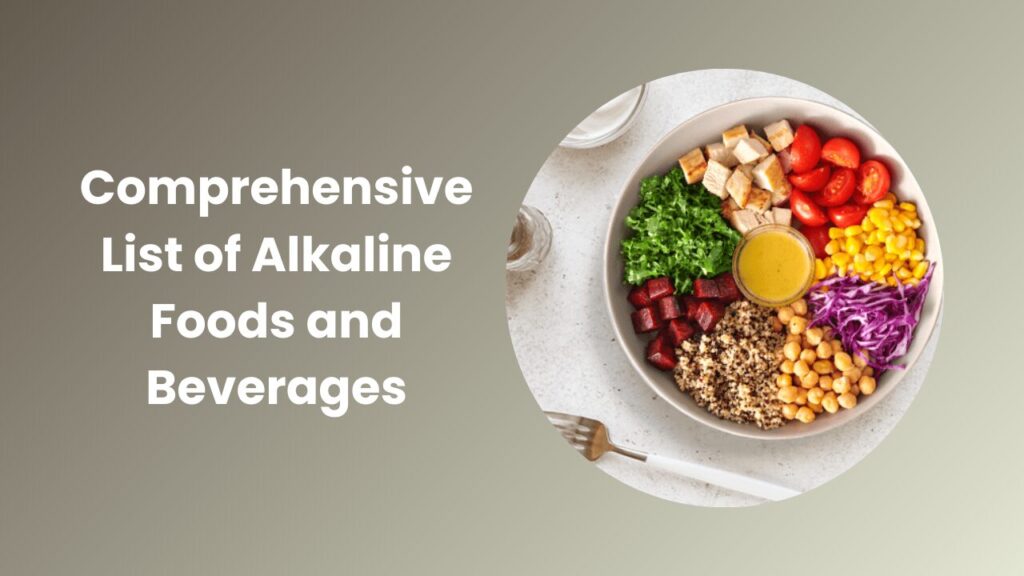Eating nutritious foods is the foundation of long-term health and vitality. Over the years, researchers and health experts have emphasized the importance of diet in preventing chronic illnesses and maintaining energy levels. One popular approach is focusing on foods and drinks that help balance the body’s pH. Consuming alkaline-rich options not only improves digestion but also supports detoxification, bone strength, and mental clarity. This article provides a complete list of alkaline foods and beverages, along with detailed explanations of their unique benefits, so you can make more mindful choices in your everyday meals.
What Are Alkaline Foods and Beverages?
The term “alkaline foods and beverages” refers to items that, once metabolized in the body, leave an alkaline residue or “ash.” This effect supports the body in maintaining a stable pH level, which is slightly alkaline at around 7.35–7.45. While the human body has natural mechanisms to regulate pH, diet plays a significant role in influencing how much stress is placed on those systems. Alkaline foods are typically fruits, vegetables, seeds, nuts, and certain grains that provide minerals like magnesium, potassium, and calcium. Alkaline beverages include herbal teas, lemon water, coconut water, and a variety of natural plant-based drinks that hydrate the body while reducing acidity.
List of Alkaline Foods and Beverages
Vegetables
Vegetables are among the most alkaline-rich foods you can eat. Their mineral content and nutrient density make them essential for reducing acidity and supporting long-term health.
Leafy Greens
Leafy greens such as spinach, kale, arugula, and Swiss chard are some of the most alkaline-forming foods available. They are packed with vitamin K, which supports bone strength, and vitamin C, which boosts immunity and collagen production. Leafy greens also contain chlorophyll, a natural detoxifying compound that helps the body eliminate toxins. Consuming leafy greens regularly improves digestion due to their high fiber content and helps maintain a healthy weight by providing satiety without excess calories.
Cruciferous Vegetables
Cruciferous vegetables like broccoli, cauliflower, cabbage, and Brussels sprouts are not only alkaline but also contain sulfur compounds that support liver detoxification. These compounds assist in neutralizing toxins and reducing inflammation in the body. Studies have linked cruciferous vegetables to a lower risk of cardiovascular disease and cancer, making them vital for long-term wellness. They also provide antioxidants such as vitamin E and selenium, which protect cells from damage caused by oxidative stress.
Root Vegetables
Root vegetables including carrots, beets, radishes, and sweet potatoes contribute to alkalinity while offering slow-digesting carbohydrates. Their natural sugars provide sustained energy without spiking blood sugar levels. Beets, for instance, are known to improve circulation and enhance endurance due to their high nitrate content. Sweet potatoes are rich in beta-carotene, which supports eye health and strengthens immunity. These root vegetables also help regulate bowel movements by providing fiber that supports gut health.
Fruits
Fruits are naturally sweet, hydrating, and a crucial part of the list of alkaline foods and healthy beverages. They replenish the body with vitamins, antioxidants, and electrolytes.
Citrus Fruits
Although citrus fruits such as lemons, oranges, and limes taste acidic, they have an alkalizing effect once metabolized. Lemons are particularly valuable because they aid liver detoxification, support collagen synthesis, and strengthen immunity with their vitamin C content. Oranges and limes provide hydration and essential antioxidants that fight infections. Consuming citrus fruits daily helps balance the body’s pH and keeps the digestive system functioning smoothly.
Berries
Berries such as blueberries, blackberries, strawberries, and raspberries are mildly alkaline but incredibly nutrient-dense. They contain anthocyanins, powerful antioxidants that protect brain function and support heart health. Their anti-inflammatory properties also benefit the skin, helping reduce signs of aging. Berries provide dietary fiber that helps regulate blood sugar levels, making them an excellent choice for people managing diabetes or insulin sensitivity.
Melons
Melons like watermelon, cantaloupe, and honeydew are considered highly alkaline and hydrating. Watermelon, composed of over 90% water, helps flush toxins and supports kidney function. Cantaloupe and honeydew are rich in vitamin A and potassium, which contribute to healthy vision and stable blood pressure. Eating melons during hot weather prevents dehydration while simultaneously promoting alkalinity in the body.
Nuts and Seeds
Nuts and seeds are portable, nutrient-dense foods that can easily be incorporated into an alkaline diet. They provide healthy fats, protein, and minerals that help maintain pH balance.
Almonds
Almonds stand out as one of the most alkaline nuts. They are rich in vitamin E, an antioxidant that supports skin health and protects against oxidative stress. Almonds also provide magnesium, which relaxes muscles and improves sleep quality. Eating a handful of almonds regularly can improve heart health by reducing cholesterol and supporting healthy blood vessel function.
Flaxseeds and Chia Seeds
Both flaxseeds and chia seeds are considered alkaline-forming due to their omega-3 fatty acid content. These essential fats reduce inflammation, support brain function, and protect heart health. Their high fiber content improves digestion and promotes a feeling of fullness, making them helpful for weight management. When soaked in water, chia seeds form a gel-like consistency that aids hydration and provides a slow release of energy throughout the day.
Beverages
Beverages are an often-overlooked category when planning an alkaline diet. Since many popular drinks like sodas, coffee, and energy drinks are acidic, switching to alkaline-friendly options can make a significant difference in your health.
Herbal Teas
Herbal teas, such as peppermint, ginger, chamomile, and rooibos, are naturally alkaline and caffeine-free. They not only soothe the digestive system but also help reduce stress and promote relaxation. For instance, chamomile tea aids sleep and relaxation, while peppermint tea eases bloating and indigestion. Drinking herbal teas regularly can also improve circulation and detoxify the body.
Lemon Water
Despite lemons being acidic in taste, lemon water has a strong alkalizing effect after digestion. Drinking it first thing in the morning stimulates digestion, flushes toxins from the liver, and provides a burst of vitamin C. Lemon water also keeps the skin radiant by supporting collagen production and helps regulate hydration by balancing electrolytes.
Coconut Water
Coconut water is naturally alkaline and packed with electrolytes such as potassium and magnesium. It is one of the best hydrating drinks, especially after exercise or in hot weather. Coconut water supports heart health, aids kidney function, and reduces fatigue. Its natural sweetness makes it a healthier alternative to sugary sports drinks and sodas.
Green Juices
Fresh green juices made from vegetables such as spinach, cucumber, celery, and kale are highly alkaline beverages that provide concentrated nutrients. They are rich in chlorophyll, which enhances detoxification and oxygenation of the blood. Drinking green juices regularly can boost energy levels, improve digestion, and strengthen the immune system. They also offer hydration while reducing cravings for processed, acidic drinks.
Almond Milk
Plant-based milks such as almond milk are excellent alkaline-friendly alternatives to cow’s milk, which is acidic. Almond milk provides vitamin E, calcium, and healthy fats without contributing to acidity. It is easy to use in smoothies, cereals, or coffee substitutes, making it a versatile choice for an alkaline diet. Its light, nutty flavor also makes it enjoyable as a standalone beverage.
Vegetable Broth
Homemade vegetable broth made from alkaline vegetables like carrots, celery, onions, and parsley is another nourishing option. It provides minerals, hydration, and warmth while being gentle on digestion. Drinking vegetable broth can also support immunity and provide comfort during cold seasons, while keeping your body’s pH balanced.
Whole Grains
Although many grains are slightly acidic, certain whole grains are alkaline-forming and highly nutritious.
Quinoa
Quinoa is one of the most versatile alkaline grains, containing all nine essential amino acids, making it a complete protein source. It is gluten-free and rich in magnesium, iron, and fiber. Quinoa supports digestion, boosts energy levels, and helps in managing blood sugar. Its ability to provide satiety makes it an excellent choice for weight management.
Millet
Millet is another alkaline grain valued for its magnesium and phosphorus content, which support bone and muscle health. It is easy to digest and provides slow-releasing energy, making it ideal for people with diabetes. Millet also contains antioxidants that help reduce oxidative stress and inflammation in the body.
Fermented Foods
Fermented foods add beneficial bacteria to the gut while supporting alkalinity.
Sauerkraut
Sauerkraut, made from fermented cabbage, is rich in probiotics that support a healthy gut microbiome. It enhances digestion, strengthens the immune system, and improves nutrient absorption. Eating sauerkraut regularly can also help reduce bloating and promote regular bowel movements.
Kimchi
Kimchi, a Korean dish made from fermented vegetables, is equally beneficial. It contains probiotics along with vitamins A, C, and K. Kimchi helps in weight management by boosting metabolism and supports heart health by lowering cholesterol levels. Its spicy flavor makes it both enjoyable and health-promoting.
Conclusion
Incorporating a wide variety from the list of alkaline foods and beverages into your diet can make a remarkable difference in overall wellness. From nutrient-packed leafy greens and root vegetables to hydrating drinks like lemon water, coconut water, green juices, and almond milk, each item plays a vital role in maintaining pH balance, improving digestion, and enhancing immunity. Making alkaline choices daily promotes energy, longevity, and resilience against disease. By gradually replacing acidic options with alkaline-rich alternatives, you empower your body to function at its best and achieve lasting health benefits.
FAQs
Why should I eat more alkaline foods?
Alkaline foods help balance body pH, reduce inflammation, and support overall health by providing essential minerals and antioxidants.
Are all fruits alkaline?
Not all fruits are highly alkaline, but many such as citrus fruits, melons, and berries contribute significantly to alkalinity after digestion.
Can alkaline water replace regular drinking water?
Alkaline water can be a good option for hydration, but it is not necessary for everyone. Drinking naturally alkaline beverages like coconut water or lemon water can provide similar benefits.
How soon can I notice changes after eating alkaline foods?
Many people experience improved digestion and energy levels within a few weeks of including alkaline foods regularly. Long-term benefits include stronger immunity and reduced risk of chronic illness.
Are all herbal teas considered alkaline?
Many herbal teas like chamomile, peppermint, and ginger are alkaline-forming, though not all have the same effect on the body.
Is coconut water better than alkaline water?
Coconut water is naturally alkaline and rich in electrolytes, making it more nourishing than plain alkaline water.





